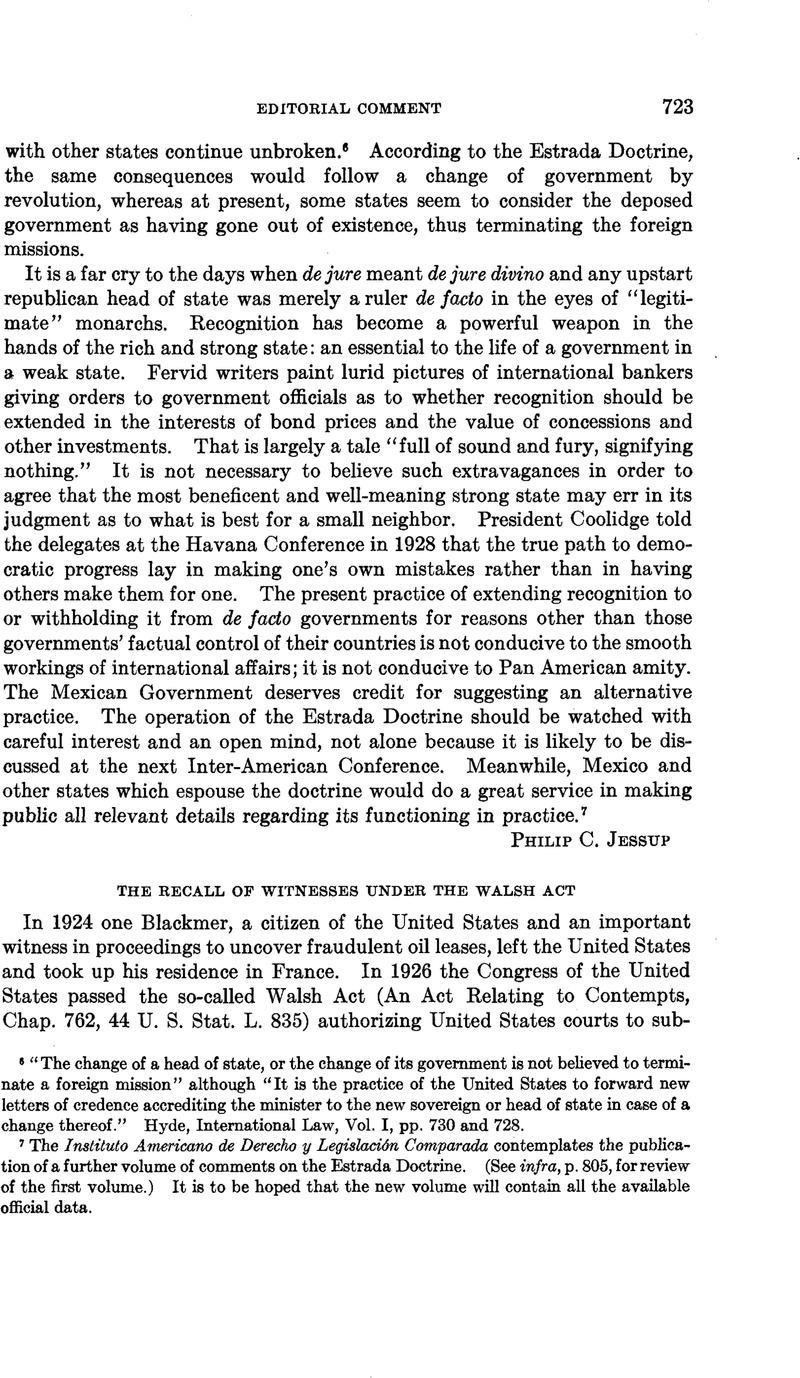No CrossRef data available.
Published online by Cambridge University Press: 12 April 2017

1 for an excellent brief review of the development of legislation, see “Compelling the Testimony of Absent Witnesses,” 43 Harv. L. Rev. 121.
2 For comment on the decision of the Supreme Court of the District of Columbia in the same case, see 41 Harv. L. Rev. 1067.
3 “ There cannot be a nation without a people. The very idea of a political community, such as a nation is, implies an association of persons for the promotion of their general welfare. Each one of the persons associated becomes a member of the nation formed by the association. He owes it allegiance and is entitled to its protection. Allegiance and protection are, in this connection, reciprocal obligations. The one is a compensation for the other;allegiance for protection and protection for allegiance.” Happersett Minor v. , 21 Wall.162,165.
4 Borchard, The Diplomatic Protection of Citizens Abroad, 21; Fauchille, TraiéDroit International Public, I, §433; Holtzendorff, Handbuch des Völkerrechts, II, 630; Westlake,International Law, 2d ed., I, 213.
5 Dicey, Conflict of Laws, 4th ed., 396; Goodrich, Conflict of Laws, 139; Beale, “Jurisdiction of Courts Over Foreigners,” 26 Harv. L. Rev. 193, 296; American Law Institute, Restatement of the Law of Conflict of Laws (Proposed Final Draft No. 1), §§49, 86; 27 Harv.L. Rev. 464.
6 Trial of Russell Earl[1901] A. C. 446; United States v. Bowman, 260 U. S. 94; France,Code of Criminal Procedure, Art. 5; Moore, “ Report on Extraterritorial Crime and the Cutting Case,” U. S. For. Rel. (1887) 757, 779; Hyde, International Law, I, 424; Westlake,Collected Papers, 127-127; Dickinson, Cases, 683-691.
7 Cook v. Tait, 265 U. S. 47; Levitt, “ Income Tax Predicated Upon Citizenship,” 11 Va.L. Rev. 607. Cf. United States v. Goelet, 232 U. S. 293.
8 “ For the failure to respond to a call to arms after emigration but prior to naturalization,the sovereign may, not unreasonably, penalize its disobedient non-resident national by depriving him, should its law so provide, of civil or other rights, or of property within its control.” Hyde, International Law, I, 668. See also Borchard, op. cit., 21.
9 “ The giving of testimony and the attendance upon court or grand jury in order to testify are public duties which every person within the jurisdiction of the government is bound to perform upon being properly summoned.” Blair v. United States, 250 U. S.273,281.
10 49 F. (2d) 523, 532.
11 Constitution, Amendment IV.
12 Ibid., Amendment V.
13 Ibid., Amendment VI.
14 Ibid., Amendment VIII.
15 Cf. Cooke v. United States, 267 U. S. 517, 537.
16 Cf. Cooper v. Reynolds, 10 Wall. 308; Pennoyer v. Neff, 95 U. S. 714, Cf. also Kempsons. Kempson, 63 N. J. Eq. 783. It is not to be doubted that Congress is competent to authorize proceedings in personam against non-resident nationals, provided that the requirements of due process are satisfied. Whether it has done so in the Walsh Act, query? Counsel for the United States conceded that the judgment against Blackmer was not in personam.
17 “While contempt may be an offense against the law and subject to appropriate punishment,certain it is that since the formation of our government proceedings to punish such offenses have been regarded as sui generis and not ‘ criminal prosecutions’within the Sixth Amendment or common understanding.” Myers v. United States, 264 U. S. 95,104.
18 See Blair v. United States, 250 U. S.273.
19 Cf. Waters-Pierce Oil Co. v. Texas (No. 1), 212 U. S. 86, 111.
20 U. S. Daily, July 13, 1931, p. 4.
21 The court pointed out that, while Section 2 of the Walsh Act makes compulsory process available only to the prosecution, Section 1 makes the same process available to the accused whenever a witness neglects or refuses to testify abroad in response to letters rogatory;further, that in a criminal prosecution only the accused may have recourse to letters rogatory.It was suggested, therefore, that the act provides the accused with “ substantially equal process to that accorded the United States.” 49 F. (2d) 523, 530. May the accused demand more than process which is substantially as efficacious as that available to the prosecution? Cf. In re Dillon, 7 Sawy. 561; Moore, Digest, V, 78. But cf. also United States v.Heinze, 218 U. S. 532, 545.
22 Jurisdiction to entertain civil suits against the person may be founded upon the person's domicile. But whether the local allegiance resulting from domicile will support jurisdiction to recall for witness duty, query?
23 The return of a non-resident national may be coerced by withdrawal of protection, expatriation,arrest upon return, or forfeiture of property within the control of the state.Of these sanctions, forfeiture of property is probably the most humane and the most efficacious.
24 See Bartue and the Duchess of Suffolk's Case, 2 Dyer, 176b; Knowles v. Luce, Moo.(K. B.) 109.
25 See Hyde, International Law, I, 828-832.
26 49 F. (2d) 523, 528>.
27 “ Actual service of process outside the state, while of course it cannot enlarge a state”s jurisdiction, would seem an essentially fair way of bringing knowledge of a pending suit to one who is subject to the jurisdiction.” Goodrich, Conflict of Laws, 139. Cf. McDonald v.Mabee, 243 U. S. 90; In re Hendrickson, 40 S. D. 211.
28 The doubts expressed in 27 Columbia L. Rev. 204, 207-209, seem to be based upon a misconception of the function which the consul performs under the Walsh Act